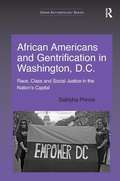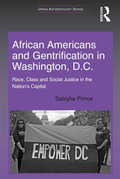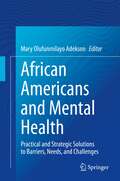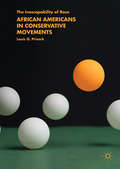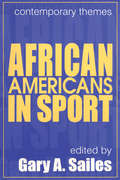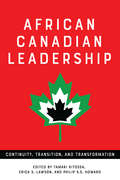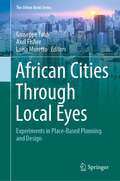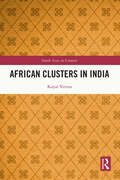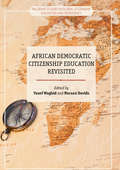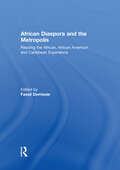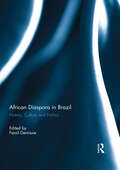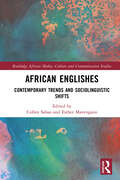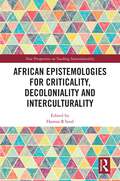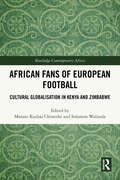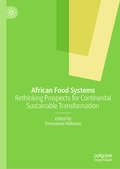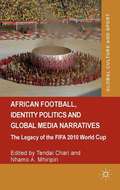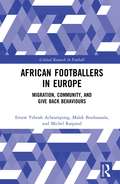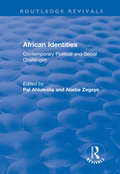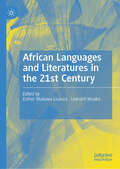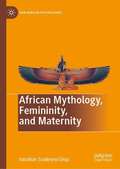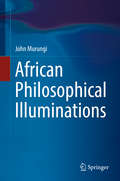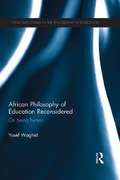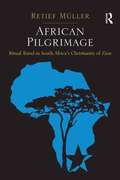- Table View
- List View
African Americans and Gentrification in Washington, D.C.
by Sabiyha PrinceUsing qualitative data, including extensive interview material and ethnographic research, to explore the experiences and ideas of African Americans as they confront and construct gentrification, this book contextualizes black Washingtonians' perspectives on belonging and attachment during a marked period of urban restructuring and demographic change in the nation's capital.
African Americans and Gentrification in Washington, D.C.: Race, Class and Social Justice in the Nation’s Capital (Urban Anthropology)
by Sabiyha PrinceThis book uses qualitative data to explore the experiences and ideas of African Americans confronting and constructing gentrification in Washington, D.C. It contextualizes Black Washingtonians’ perspectives on belonging and attachment during a marked period of urban restructuring and demographic change in the Nation’s Capital and sheds light on the process of social hierarchies and standpoints unfolding over time. African Americans and Gentrification in Washington, D.C. emerges as a portrait of a heterogeneous African American population wherein members define their identity and culture as a people informed by the impact of injustice on the urban landscape. It presents oral history and ethnographic data on current and former African American residents of D.C. and combines these findings with analyses from institutional, statistical, and scholarly reports on wealth inequality, shortages in affordable housing, and rates of unemployment. Prince contends that gentrification seizes upon and fosters uneven development, vulnerability and alienation and contributes to classed and racialized tensions in affected communities in a book that will interest social scientists working in the fields of critical urban studies and urban ethnography. African Americans and Gentrification in Washington, D.C. will also invigorate discussions of neoliberalism, critical whiteness studies and race relations in the 21st Century.
African Americans and Mental Health: Practical and Strategic Solutions to Barriers, Needs, and Challenges
by Mary Olufunmilayo AdeksonThis book enumerates the unique challenges, barriers, needs, and trauma of being an African American in the United States, and at the same time highlights what needs to be done to improve and foster the mental health healing of this population. This includes practical applications and strategic solutions that work, such as the family togetherness and ardent spiritual beliefs that form the basis for resilient and vibrant mental health among African Americans. This contributed volume features the authorship of counseling professionals, most of whom are African American themselves. Because of their own personal experiences, they are able to emphasize cogent helping strategies for this population, to show how to move forward with encouragement. The book also highlights ways to promote life that is mentally healthy and holistic for African Americans.Topics covered within the chapters include:Mental Health Challenges Unique to African American Children and AdolescentsDiagnosis Issues with African Americans Culture of Family Togetherness, Emotional Resilience, and Spiritual Lifestyles Inherent in African Americans from the Time of Slavery Until Now The Trauma of Being an African American in the 21st Century Training, Recruiting, and Retaining African American Mental Health ProfessionalsAfrican Americans and Mental Health: Practical and Strategic Solutions to Barriers, Needs, and Challenges is an essential resource for helping professionals who work with this population, including psychiatrists, counselors, psychologists, social workers, and other mental health professionals. The book also should be of interest to researchers, instructors, and students in Counseling, Social Work, and Psychology.
African Americans in Conservative Movements: The Inescapability of Race
by Louis G. PrisockReveals the limitations of the “one-size fits all” perspective commonly used in conversations about African American conservatives.<P><P> Unwinds the complexities of black conservative relationships to the wider conservative movement and American society as large.<P> Explores what the Right and the African American conservative can do to avoid suspicions of “tokenism”.<P>Providing an expansive view of the making and meaning of African American conservatism, this volume examines the phenomenon in four spheres: the political realm, the academic world, the black church, and grass-roots activism movements. In his analysis of their activities in these realms, Louis Prisock examines the challenges African American conservatives face as they operate within the context of (largely white) conservatism. At the same time that African American conservatives challenge the white conservative movement’s principle of “color blindness,” they are accused of being “racial mascots,” or “tokens” from those outside of it. Prisock unwinds the intricacies of black conservatives’ relationships to both the wider conservative movement and the everyday life experiences of black Americans, showing that they are as vulnerable to the “inescability of race” as any other individual in a racialized America
African Americans in Sports
by Gary A. SailesResearch on African American athletes generally fo-cuses on negative stereotypes of physical prowess, and socially controversial themes. Most studies in-vestigate racism, prejudice, discrimination, and ex-ploitation experienced by African American athletes. Many studies contrast African American and white athletes on a number of variables that support pre-vailing elitist stereotypes and denigrate African Ameri-can athletes. But few studies investigate the diverse and complex cultural dichotomies within the infrastruc-ture of sport in the African American community. Gary Sailes maintains that it is crucial to develop a more eclectic and immersed cultural approach when investigating African American involvement in com-petitive sports. The contributors to 'African Americans in Sports' show that there are also intrinsic cultural paradigms that are evident, presenting an informa-tive and interesting narrative regarding African American athletes. The chapters that make up this volume were written by noted scholars who were selected based on their expertise in their specific academic areas. They write about different components of the experience of African American male athletes. Chapters and contributors include: "Race and Athletic Performance: A Physiological Review" by David W. Hunter; "The Athletic Dominance of African Americans--Is There a Genetic Basis?" by Vinay Harpalani; "African American Player Codes on Celebration, Taunting, and Sportsmanlike Conduct" by Vernon L. Andrews; and "Stacking in Major League Baseball" by Earl Smith and C. Keith Harrison. Many chapters were originally published as a special issue of the 'Journal of African American Men.' This volume should be read by all those involved in athletics, as well as by sports sociologists and African American studies scholars.
African Calliope: A Journey to the Sudan
by Edward Coolbaugh HoaglandFollow Hoagland's travels, from equatorial mountain forests to the Sahara desert; from small Sudanese towns in the south and west to short stays in the capital, Khartoum. Hoagland's eye for detail presents the reader with electrifying images of life in the Sudan - rotten diets, disease, coups and civil war, the traders, poachers, tribal headmen, and those who come to help.
African Canadian Leadership: Continuity, Transition, and Transformation
by Tamari Kitossa Erica S. Lawson Philip S.S. HowardChallenging the myth of African Canadian leadership "in crisis," this book opens a broad vista of inquiry into the many and dynamic ways leadership practices occur in Black Canadian communities. Exploring topics including Black women’s contributions to African Canadian communities, the Black Lives Matter movement, Black LGBTQ, HIV/AIDS advocacy, motherhood and grieving, mentoring, and anti-racism, contributors appraise the complex history and contemporary reality of blackness and leadership in Canada. With Canada as a complex site of Black diasporas, contributors offer an account of multiple forms of leadership and suggest that through surveillance and disruption, practices of self-determined Black leadership are incompatible with, and threatening to, White "structures" of power in Canada. As a whole, African Canadian Leadership offers perspectives that are complex, non-aligned, and in critical conversation about class, gender, sexuality, and the politics of African Canadian communities.
African Cities Through Local Eyes: Experiments in Place-Based Planning and Design (The Urban Book Series)
by Giuseppe Faldi Axel Fisher Luisa MorettoThis book provides readers with a wide overview of place-based planning and design experiments addressing such powerful transformations in the African built environment. This continent is currently undergoing fast paced urban, institutional and environmental changes, which have stimulated an increasing interest for alternative architectural solutions, urban designs and comprehensive planning experiments. The international and balanced array of the collected contributions explore emerging research concepts for understanding urban and peri-urban processes in Africa, discuss bottom-up planning and design practices, and present inspirational and innovative co-design methods and participatory tools for steering such change through public spaces, sustainable services and infrastructures. The book is intended for students, researchers, decision-makers and practitioners engaged in planning and design for the built environment in Africa and the Global South at large.
African Clusters in India (South Asia in Context)
by Koyal VermaAfrican Clusters in India examines the discrimination and stereotypes faced by the African migrants in India. It outlines the narratives of the migrants and demonstrates how their ‘African identity’ gets associated with drugs, prostitution, and cannibalism. The book brings to the fore how the African migrants experience racial profiling based on a conflated African identity, and how this identity gets generalised irrespective of their different nationalities and leads to social exclusion. This monograph argues that the antagonistic urban environment facilitates the formation of a pan-African identity as a response to biases and stereotypes. It also explores the role of language, culture, and politics of representation to show the process of othering and exclusion in India. Drawing on lived experiences of the migrants, the volume engages with the larger discourse of globalization, liberalisation, and migration within the global south. It will be of great interest to scholars and researchers of critical race theory, ethnography, urban sociology, African studies, and South Asian studies
African Democratic Citizenship Education Revisited (Palgrave Studies in Global Citizenship Education and Democracy)
by Nuraan Davids Yusef WaghidThis edited collection explores how democratic citizenship education manifests across the African continent. A recognition of rights and responsibilities coupled with an emphasis on deliberative engagement among citizens, while not uniquely African, provides ample evidence that the concept can most appropriately be realised in relation to its connectedness with experiences of people living on the continent. Focussing on a diverse collection of voices, the editors and authors examine countries that have an overwhelming allegiance to democratic citizenship education. In doing so, they acknowledge that this concept, enveloped by a certain Africanness, has the potential to manifest in practices across the African continent. By highlighting the success of democratic citizenship education, the diverse and varied contributions from across this vast continent address the malaise in its implementation in countries where autocratic rule prevails. This pioneering volume will be an invaluable resource for researchers and students working in the fields of education and sociology, particularly those with an interest in education policy, philosophy of education and global citizenship initiatives.
African Diaspora and the Metropolis: Reading the African, African American and Caribbean Experience
by Fassil DemissieAt the end of the 19th and at the beginning of the 20th century, a number of African American and Caribbean intellectuals and immigrants of the African Diaspora with all their apprehensions set out in steamships en route and carried with them a certain presence to the metropoleis of Europe and North America. These individuals traversed the "middle passage" in the opposite direction from the forced journey undertaken by their enslaved ancestors. Later they began to arrive in large numbers as free men and women in London, Paris, Berlin, Madrid, Brussels, Lisbon, New York, and other places in the metropolis by steam ships and later by planes, and were actors in the larger history of empire from which the imperatives of forced migration, uprooting, displacement, and exile had arisen.The texts selected offer critical examination of a broad range of African Diaspora experiences in the metropole drawn from Senegal, the Caribbean, United States, Britain, Nigeria and France. Bringing together comparative and diasporic perspectives, the book explores the complex roles that race, gender, sexuality and history have played in the formation of African Diaspora identities in the metropole since the 19th century.This book was published as a special issue of African and Black Diaspora: An International Journal.
African Diaspora in Brazil: History, Culture and Politics
by Fassil DemissieThe term 'Black Atlantic' was coined to describe the social, cultural and political space that emerged out of the experience of slavery, exile, oppression, exploitation and resistance. This volume seeks to recast a new map of the 'Black Atlantic' beyond the Anglophone Atlantic zone by focusing on Brazil as a social and cultural space born out of the Atlantic slave trade.The contributors draw from the recently reinvigorated scholarly debates which have shifted inquiry from the explicit study of cultural 'survival' and 'acculturation' towards an emphasis on placing Africans and their descendants at the center of their own histories. Going beyond the notion of cultural 'survival' or 'creolization', the contributors explore different sites of power and resistance, gendered cartographies, memory, and the various social and cultural networks and institutions that Africans and their descendants created and developed in Brazil. This book illuminates the linkages, networks, disjunctions, sense of collective consciousness, memory and cultural imagination among the African-descended populations in Brazil.This book was originally published as a special issue of African and Black Diaspora: An International Journal.
African Englishes: Contemporary Trends and Sociolinguistic Shifts (Routledge African Media, Culture and Communication Studies)
by Esther Mavengano Collen SabaoThis book investigates the functions and linguistic forms of African Englishes, and what this means for languages indigenous to Africa.It examines the historical imposition of English on the continent, as part of a broader project of cultural imperialism, and traces its transformation from a colonial tool to a dynamic and diverse language, examining its set of contemporary usage patterns, and its likely future directions. Thorough diverse critical approaches, this book unpacks how language contact has given rise to distinct variations including second language varieties, pidgins and creoles, that are moulded by Africa´s linguistic and cultural diversity. Drawing on case studies from West, East, and Southern Africa, this book illuminates contemporary English usages in multilingual spaces, where cultural and linguistic plurality drive ongoing shifts in communication. More than just being a study of language change, this book calls for a reassessment of the future of African Englishes and their impact on indigenous languages.Thus, the book is an essential read for scholars and students in linguistics, African Studies, and World Englishes, as it contributes fresh insights into the intersections of language, culture, identity, and power in modern-day African lifeworlds.
African Epistemologies for Criticality, Decoloniality and Interculturality (New Perspectives on Teaching Interculturality)
by Hamza R'BoulThis book addresses the underrepresentation and, more importantly, the misrepresentation of African epistemologies and traditions of thought in making sense of, theorizing, and doing interculturality.Africa remains (probably) the most oppressed and silenced sphere throughout centuries of colonialism and contemporary coloniality. Therefore, such an anthology provides a platform for those insights that have substantial epistemic capacity to alter our taken‑for‑granted notions of what interculturality is and what it is about. While a number of works have charted the contributions of African epistemologies in advancing our understanding of our intercultural realities, this book argues that the processes of decoloniality through and within interculturality have never been about (under) (mis)representation per se, but about how the politics of representation can provide inaccurate, tokenistic, and false inclusion. This book aims to substantiate the notion that decoloniality and interculturality are mutually inclusive, to demonstrate the affordances of African epistemologies in advancing intercultural knowledge, and to support the need to make visible philosophical and power‑literate approaches to interculturality.This book will be essential reading for scholars and students interested in African philosophy, African epistemology, and, more broadly, interculturality and intercultural communication.
African Fans of European Football: Cultural Globalisation in Kenya and Zimbabwe (Routledge Contemporary Africa)
by Manase Kudzai Chiweshe Solomon WaliaulaThis book examines the increasing influence of European football in African societies, considering the processes and significance of being a fan and what this means for the wider globalisation of popular culture.Focussing on fan cultures in Kenya and Zimbabwe, the book argues that instead of manifestations of neo-colonialism, African fandoms of European football are practised in ways that resonate with and help reconstruct and perform the socio-cultural substance of the African communities in question. European football is therefore instrumentalised to help define the identities of the members of the fandom communities and articulate their experience of their reality in their immediate circumstances.This book reflects how the global and local can coalesce in cultural trends such as football fandom. It will interest sports, leisure, popular culture, and social anthropology researchers in Africa and beyond.
African Food Systems: Rethinking Prospects for Continental Sustainable Transformation
by Emmanuel NdhlovuThis book explores the evolving nature of food systems in Africa, which are at crisis point. The authors present case studies from across the continent to propose innovative and contextually relevant approaches to food systems resilience and food systems sustainable transformation. They investigate the contemporary challenges to food systems in Africa, including climate change, pandemics, energy challenges and war and conflict, inside and outside Africa. This book demonstrates how approaches to food can shift away from production, consumption and value chains toward safety, networks and complexity. This book brings new insight to the challenges in food systems from many disciplines, from agriculture, tourism, health, climate science, AI and digital science, political science and economics.
African Football, Identity Politics and Global Media Narratives
by Tendai Chari Nhamo A. MhiripiriThis edited volume addresses key debates around African football, identity construction, fan cultures, and both African and global media narratives. Using the 2010 FIFA World Cup in South Africa as a lens, it explores how football in Africa is intimately bound up with deeper social, cultural and political currents.
African Footballers in Europe: Migration, Community, and Give Back Behaviours (Critical Research in Football)
by Ernest Yeboah Acheampong Malek Bouhaouala Michel RaspaudAfrican Footballers in Europe traces the social and economic evolution of African football and examines the strategies and resources that players mobilise in their migrations, with a particular focus on ‘Give Back Behaviours’ (how players contribute to their countries or communities of origin). It shines new light on contemporary migrations, labour markets in sport, and processes of development in Africa. Using a multidisciplinary approach and Weberian methodology to analyse players’ 'Give Back' behaviour, the book highlights the complex rationale behind this behaviour, based on a combination of social, cultural, and economic elements. It features interviews with former and current African professional players, providing a vivid picture of the role of communities in players’ migration projects, the allure of the European football market, and investment initiatives that can contribute to local and regional development. This is a vital read for academics, researchers, and students of sport sciences, sociology of sport, sport management, sociology, geography, political sciences, management, sociology of Africa, migration studies, sociology of the labour market, and economic sociology. It is also an important resource for professional organisations, NGOs, football agents, football administrators, federations, confederations, and governments.
African History through Sources
by Nancy J. JacobsAfrican History through Sources recounts the history of colonial Africa through more than 100 primary sources produced by a variety of actors: ordinary men and women, the educated elite, and colonial officials. Including official documents, as well as interviews, memoirs, lyrics, and photographs, the book balances coverage of the state and economy with attention to daily life, family life, and cultural change. Entries are drawn from all around sub-Saharan Africa, and many have been translated into English for the first time. Introductions to each source and chapter provide context and identify themes. African History through Sources allows readers to analyze change, understand perspectives, and imagine everyday life during an extraordinary time.
African Identities: Contemporary Political and Social Challenges (Routledge Revivals)
by Pal Ahluwalia Abebe ZegeyeThis title was first published in 2003. Aimed at examining contemporary debates and issues which are at the cutting edge of the social sciences, Pal Ahluwalia and Abebe Zegeye have put together a book on subjects of critical importance to the African condition. A combination of empirical and theoretical materials, this text introduces new perspectives.
African Languages and Literatures in the 21st Century
by Esther Mukewa Lisanza Leonard MuakaThis edited book examines the crucial role still played by African languages in pedagogy and literatures in the 21st century, generating insights into how they effectively serve cultural needs across the African continent and beyond. Boldly positioning African languages as key resources in the 21st century, chapters focus on themes such as language revolt by marginalized groups at grassroots level, the experience of American students learning African languages, female empowerment through the use of African languages in music, film and literary works, and immigration issues. The contributions are written by scholars of language, literature, education and linguistics, and the book will be of interest to students and scholars in these and related areas.
African Mythology, Femininity, and Maternity (Pan-African Psychologies)
by Ismahan Soukeyna DiopThis book explores feminine archetypes and mythological figures in African and European traditions with an underlying goal of describing the foundations of social status for women. The author provides a rich corpus of mythology and tales to illustrate aspects of female and mother-daughter relationships. Diop analyzes the symbolic aspects of maternity and femininity, describing the social meaning of the matrix, breasts, and breastfeeding. A retrospective of female characters in African literature brings an interesting approach to explore the figures of femininity and maternity in society. After an extensive analysis of African mythology and tales, the author proposes a way to integrate them in the clinical psychotherapy as a projective material. The analysis of clinical cases offers an example of how this material can be used in therapy with women from African descent.
African Philosophical Illuminations
by John MurungiThe illumination of African philosophy offered in this volume leads to the illumination of philosophy in general. Illuminating arises as an essential task of philosophy, whether African or not. What is illuminated is not already there, but is constituted at the moment of illumination. This book invites the reader to participate in the illuminating work of philosophy and necessarily, thereby, to contribute to his or her own self-constituting self-illumination. Although the focus is on African philosophy, the book also bridges the gap between African philosophy and other branches. Today more than ever, a bridging philosophy is called for, and this book helps to meet that need. This book poses philosophical questions such as who is an African and what Africa is, and seeks philosophical answers. In doing so, it contributes to the ongoing discourse on African philosophy. It addresses such issues as the African grounding of philosophy, the difference between African and Black philosophy, the African body, African art as expressed in and by Chiwara, the plight of African trees as the plight of Africans, and the symbolic meaning of Robben Island.
African Philosophy of Education Reconsidered: On being human (New Directions In The Philosophy Of Education Ser.)
by Yusef WaghidMuch of the literature on the African philosophy of education juxtaposes two philosophical strands as mutually exclusive entities; traditional ethnophilosophy on the one hand, and �scientific� African philosophy on the other. While traditional ethnophilosophy is associated with the cultural artefacts, narratives, folklore and music of Africa�s peop
African Pilgrimage: Ritual Travel in South Africa's Christianity of Zion
by Retief MüllerYears after the end of Apartheid South Africa remains racially polarized and socially divided. In this context pilgrimage and travelling rituals serve to help those who often find themselves at the bottom end of the social ladder to make sense of their world. This book describes a South Africa that is made up of a number of different fragmented worlds. The focus is on the Zion Christian Church, one of the largest religious movements in southern Africa, and a good example of indigenized African Christianity. Pilgrimage plays an important role in reintegrating some of those fragmented worlds into something approaching wholeness. This book tells the story of how the enduring ritual of pilgrimage is transforming African religion, along with the lives of ordinary South Africans.
